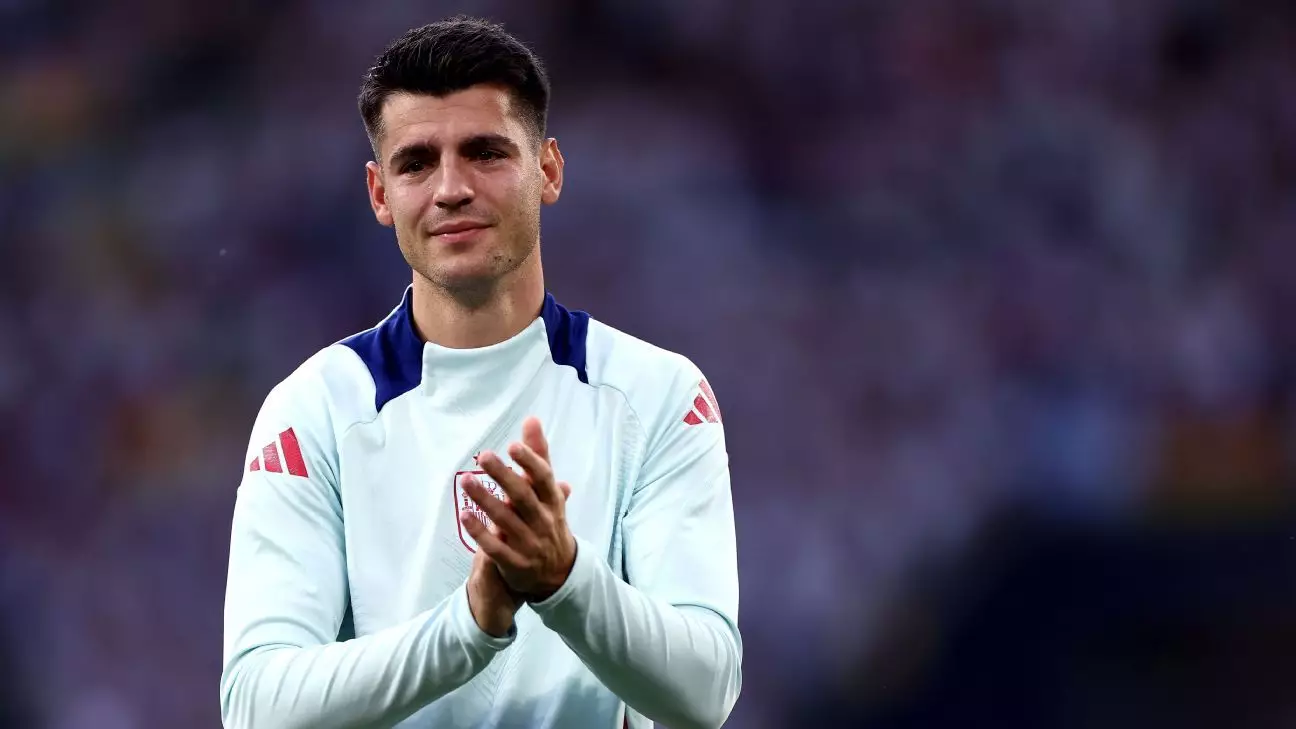In the high-stakes world of professional sports, the glare of public scrutiny can be both exhilarating and suffocating. For players like Álvaro Morata, a forward for the Spanish national football team, this intense spotlight can lead to unforeseen psychological challenges. Morata recently opened up about his struggles with depression and panic attacks leading up to a victorious European Championship campaign in 2024. His candid reflections not only shed light on his personal battle but also highlight a growing need for dialogue around mental health in the sporting realm.
Morata’s story is not just about the acclaim that comes with lifting a trophy; it is equally about the emotional turmoil that can accompany fame and expectation. During a recent interview with COPE radio, he revealed that he contemplated leaving the national team amid dark moments of self-doubt and an overwhelming sense of despair. “When you have really tough moments, the job you do doesn’t matter what job you do,” he explained poignantly. Such statements speak volumes about the omnipresence of mental health challenges, often overshadowed by the glamour associated with athletic success.
His experience serves as a stark reminder that professional athletes are human too; they endure vulnerabilities, fears, and moments of difficulty just like anyone else. The stigma surrounding mental health issues, especially in the field of sports, often renders athletes hesitant to speak about their struggles, for fear of reprisal, mockery, or diminished perception. Yet Morata’s willingness to share his experience is a significant step forward in dismantling that stigma.
The Impact of Criticism
Morata’s relationship with fans has been fraught with tension and criticism over the years. He acknowledges that negative feedback from supporters deeply impacted both him and his family. “I felt embarrassed to be with my kids, to go out into the street,” he confessed, illustrating how the consequences of fame can ripple out into private life. For Morata, outings with his children became scenarios fraught with anxiety, as he often faced unsolicited commentary on his playing performance.
This experience poignantly encapsulates a broader issue faced by many athletes: the blurring of personal identity with public persona. For Morata, the pressure to perform, compounded by public outcry, brought him to a crossroads where he seriously questioned the value of continuing in the limelight. Such circumstances underscore the urgent need for athletes to establish support systems that prioritize mental wellness.
Despite grappling with these internal struggles, Morata have found ways to navigate the challenges that accompany professional sports. His eventual decision to captivate his side to victory in the European Championship not only exemplifies resilience but also acts as a source of motivation for those facing similar struggles. The triumph he experienced on the pitch acts as a touching contrast to his earlier distress.
After the tournament, Morata left Atletico Madrid to pursue a new chapter with AC Milan, where he has continued to find success, scoring two goals in his first five Serie A appearances. This transition signifies not only a change in teams but also a potential transformation in mindset. While he faced difficult choices regarding his future in football, including strange thoughts of possible retirement, he ultimately embraced the next challenge with renewed vigor.
Álvaro Morata’s journey serves as both an inspiration and a wake-up call. His story highlights the importance of advocating for mental health awareness in sports. The burdens athletes carry can often go unseen, but conversations like Morata’s are essential for fostering understanding and empathy within the sporting community and beyond. As fans and stakeholders in sport, it is our responsibility to support athletes not just in their victories but in their struggles as well.
Ultimately, Morata’s openness about his mental health challenges encourages a cultural shift towards greater acceptance and support for athletes. When stars like him bravely share their experiences, they pave the way for others to speak out, thus creating a healthier and more respectful environment in which athletes can thrive. In the long run, addressing mental health in sports not only strengthens individual athletes but also enriches the entire sporting culture.

Leave a Reply